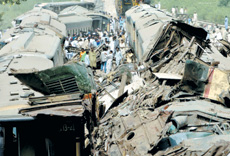KARACHI, 14 July 2005 — Three passenger trains collided in a deadly nighttime crash at the remote Ghotki station in southern Sindh Province yesterday, killing nearly 200 people and injuring hundreds more.
The driver of one express train misread a signal and plowed into a stationary train full of sleeping passengers, then a third train slammed head-on into the wreckage, according to officials.
Several hours after the crash, rescuers were still pulling bodies from the mangled carriages of the three trains, which lay scattered amid piles of debris and pieces of flesh.
“We woke up to a huge bang,” said Suraya, a 22-year-old woman. “I fell down to the floor. Then I heard the screams.”
At the scene, villagers and surviving passengers — some splattered with blood — peered into the wreckage looking for victims. Massive train wheels, springs and other train parts ripped from carriages were scattered between the tracks. Cars that had jumped the tracks lay on their side. Others were crumpled into heaps of twisted metal and had crushed motorcycles, cooking pots and other items near the crash site.
Bodies of victims were wrapped in white cloth and piled together.
“It is a very gruesome situation. Nearly 200 people have died and hundreds more were injured,” local police chief Agha Mohammed Tahir said. The injured were admitted to a hospital in Ghotki.
“We heard a big explosion and several coaches overturned. As the people in our train were screaming and shouting there was another deafening explosion,” injured survivor Mohammad Ahmed said.
Pakistan’s President Pervez Musharraf ordered an urgent investigation and promised to punish those responsible for the pre-dawn pileup, the country’s worst in 15 years.
“It’s a tragic accident, I am deeply saddened I express my condolences,” he told state television. “It was not sabotage, it appears to have been caused by some carelessness.”
Military spokesman Maj. Gen. Shaukat Sultan said the army was supervising the rescue work and troops cordoned off the crash site.
Around 50 ambulances from civil and military hospitals and the private Edhi Welfare Trust were shuttling between hospitals and the disaster site, witnesses said.
Abdul Wahab Awan, general manager of Pakistan Railways, blamed the driver of the night-coach Karachi Express for misreading a signal and rear-ending another passenger train. The accident happened when one of the trains, the Quetta Express, stopped for repairs at Sarhad station, seven kilometers from Ghotki, and the Karachi Express coming from Lahore smashed into it at 4 a.m.
A number of carriages were catapulted onto a parallel track and a third train, the Tez Gam Express heading for Islamabad’s twin city Rawalpindi, then careered into them.
Most of the casualties were said to be on board the Tez Gam train. In all 16 coaches were derailed — 12 from the Tez Gam train, three from the Quetta Express and one from the Karachi Express, along with its engine.
Three villagers who had come to help after the first impact were also killed by the second, police said. Rescuers used electric cutters to recover bodies and wounded passengers from the smashed carriages, while two relief trains have also been rushed to the area to help, officials said.
“Most of the bodies were badly mutilated,” said rescue worker Haider Bakhsh. “They were reduced into pieces of flesh. Many had no limbs.”
“It’s a painful scene. There are bodies scattered all over. People are crying, fathers are looking for children, husbands for their wives and brothers for their sisters,” a witness told AFP by telephone.
The smash halted all railway traffic in the area, which is 400 kilometers northeast of Karachi, and it would take many hours to restore the service.
Worried relatives thronged to several railway stations across Pakistan to inquire about family members traveling on the trains, Dozens of people have been killed in recent years on Pakistan’s aging railway system.
In 1991 another crash at Ghotki between a passenger train and a goods train killed 50 people according to authorities and between 100 and 200 according to press reports.
A year earlier, more than 350 people were killed and 700 injured when a goods train collided with a passenger train in Sangi, near Ghotki.
— With input from agencies


